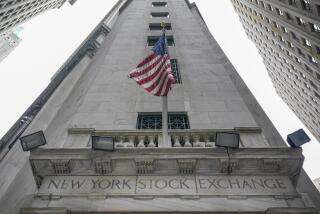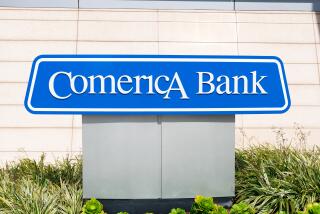U.S. Banks Should Weather Brazil’s Woes
- Share via
Despite a weeklong sell-off in many stocks, U.S. banks are fairly well-positioned to withstand Brazil’s unexpected currency devaluation, experts said Thursday.
Banks aggressively reduced their lending and securities trading activity in Brazil throughout last year, amid growing concern about the Latin American nation’s precarious economic condition. Though some losses are likely, they should be far smaller than those resulting from last year’s surprise devaluation and debt default in Russia.
“The Brazil news isn’t really a shocker,” said James Schmidt, manager of the John Hancock Regional Bank fund. “We were kind of waiting for this to happen.”
Nevertheless, bank stocks suffered their fourth day of selling Thursday. The Philadelphia Stock Exchange/Keefe, Bruyette & Woods bank-stock index tumbled 3.7%, bringing its loss for the week to 9.3%. That has coincided with a broad stock market downturn, in which the Dow Jones industrial average has sagged 5.4%.
Some investors apparently are worried that Brazil’s action will deepen its economic downturn and infect the Argentine and Mexican economies. Standard & Poor’s Corp. also cut its credit-rating outlook for seven banking companies to “negative” Thursday, because of possible emerging-market losses.
But, experts say, many investors simply grabbed the opportunity to take some money off the table, after a strong bank stock rally that began in October.
“It’s a combination of genuine concern and an excuse for profit-taking,” said Carla D’Arista, head of bank research at Friedman Billings Ramsey Group, an investment banking and money management firm in Arlington, Va.
Though its troubles are well-known, Brazil’s sudden decision Wednesday to devalue its currency by about 8% caught many off guard. Despite a planned $41.5-billion bailout from the International Monetary Fund, Brazil gave the organization scant notice of what it was about to do.
Of the five banking companies with the biggest exposure to Latin America, four are large “money center” institutions: Citigroup, Chase Manhattan, Bankers Trust and J.P. Morgan. The fifth, BankBoston, has had a significant Brazilian presence for many years, Schmidt said.
Of the international banking companies downgraded by S&P;, three are based in the U.S. They are Citigroup, parent of Citibank, J.P. Morgan and BankBoston.
In the last year, statistics show, banks have slashed their so-called cross-border exposure to Brazil, which includes such things as loans, derivatives and some trading activity.
At Chase Manhattan, for example, exposure was $4.9 billion in December 1997 and $3.8 billion at the end of September, said David Berry, research director at Keefe, Bruyette & Woods Inc., a bank research firm in New York. The bank probably trimmed its exposure further in the fourth quarter.
Through the third quarter, Bankers Trust cut its exposure to $900 million from $1.9 billion, and J.P. Morgan pulled back to $2.2 billion from $3.6 billion.
On average, Brazilian loans equal about 15% to 20% of the banks’ capital, Schmidt said. Even if an institution were to write down the value of its portfolio by one-third, that would clip only about 5% of its equity, he said.
Though they both devalued their currencies, Brazil’s situation differs markedly from Russia’s, experts said. In Russia, the government defaulted on debt, which Brazil is not doing. And Russia’s action was wholly unexpected, causing notable trading losses in Russian bonds.
“It’s not like Russia, where you went from [bond values of] 100 cents on the dollar to 10 cents on the dollar in a matter of days,” D’Arista said.
(BEGIN TEXT OF INFOBOX / INFOGRAPHIC)
Sliding Again
Major bank stocks were slammed during the emerging-market turmoil of last fall, then recovered most of their losses in the fourth quarter. But the stocks have been hammered again this week by Brazil’s financial troubles. Weekly closes and latest for the Philadelphia Stock Exchange/Keefe Bruyette index of 24 major U.S. banks:
Thursday: ’88.21 (-3.7%)
Source: Bloomberg News
More to Read
Sign up for Essential California
The most important California stories and recommendations in your inbox every morning.
You may occasionally receive promotional content from the Los Angeles Times.













